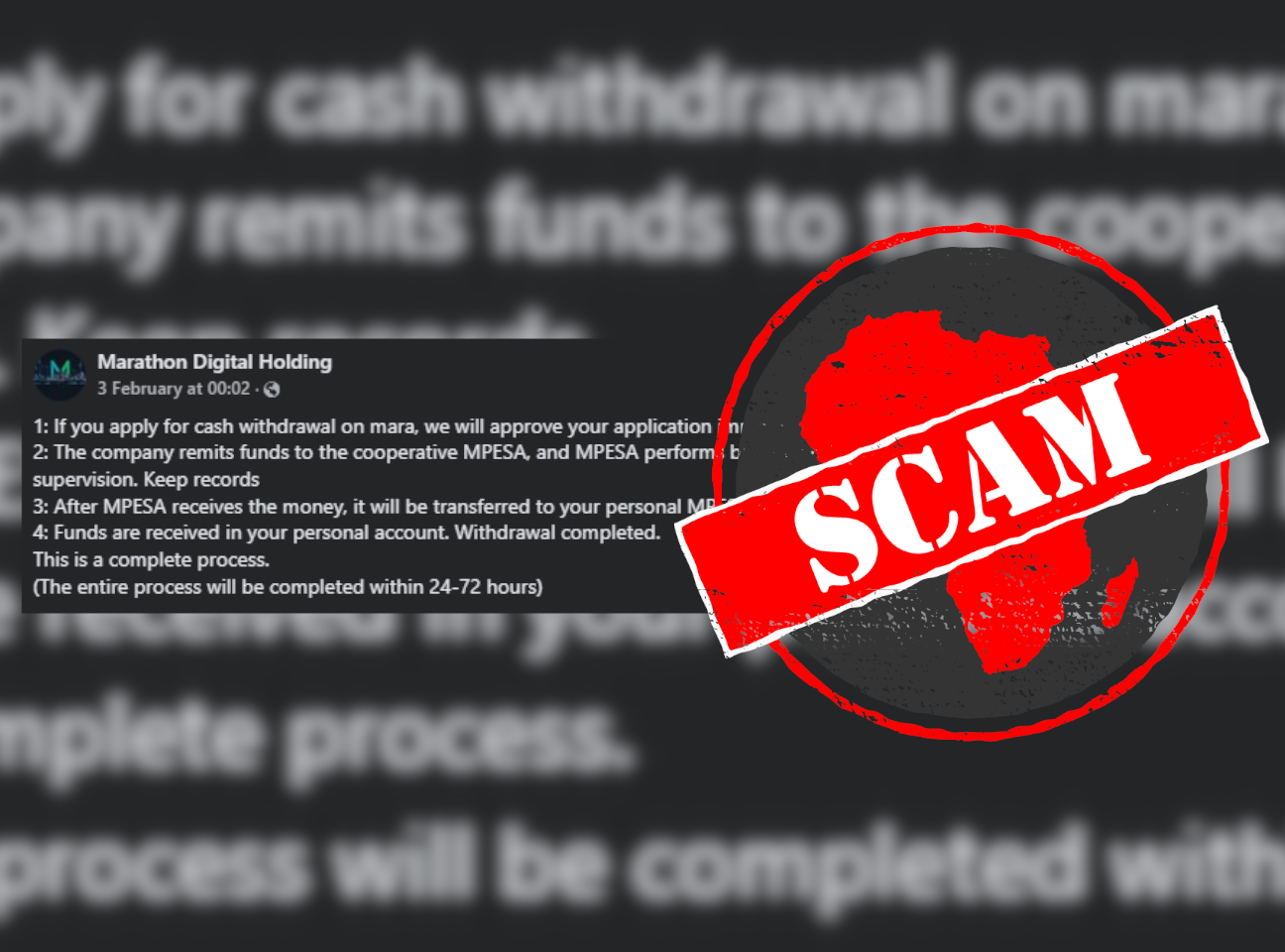IN SHORT: “MARA Company” is likely a pyramid scheme masquerading as the US-based bitcoin mining firm called Marathon Digital Holdings. The real company has no operations in Kenya and a completely different business model.
People claiming to be from a US company have been trying to recruit Kenyans on Facebook in the early months of 2024, promising guaranteed returns.
Various posts refer to Mara, Marathon Digital Holdings and Marathon Cloud Limited, among others.
What they all have in common is that they claim to be the Kenyan branch of a real US company called Marathon Digital Holdings, which trades as “MARA” on the Nasdaq, the benchmark index of US technology stocks.
To increase their reach, the posts are published in groups with hundreds of members, some of which are named variations on “MARA”. Messaging apps are also used to help recruit members.
Most of the links shared in Kenya led to two websites, marake.com and marake.org, which were designed to look like they belong to the legitimate US company. The websites appear to have been taken down but screenshots of their offerings can be seen below.
But is this a legitimate company and is it really affiliated with the real Marathon Digital Holdings company? We checked.

Suspicious business model
Africa Check examined the company’s PDF recruitment document, where it describes itself and its business model.
It claims to have a physical office in Kenya, but gives no Kenyan company registration details. The PDF is set up as a sales guide to recruit members, who must “lease a machine” to join.
The company claims to offer different models of “cryptocurrency machines” for people to rent at different rates to make a certain amount of money on a daily basis. Recruits are then expected to bring in more members in order to benefit from the new members' earnings, suggesting a type of pyramid scheme.
Pretending to be the real company
In both the PDF and on the two websites, the company claims to be US-based Marathon Digital Holdings, even including graphics showing Marathon's share price. But the real Marathon, which is involved in large-scale bitcoin mining, doesn't sell anything to the public and doesn't operate in Kenya.
On the legitimate Marathon company website, the public is specifically warned against scammers using the MARA name. The company does not accept money directly from consumers and doesn't operate in Kenya.
Red flags
The sales PDF is riddled with red flags, including many typos. It misrepresents what MARA is and what it does.
The PDF includes a photo of what is labelled as the company’s “warehouse”. But a reverse image search reveals that the photo is of an old facility belonging to another US-based bitcoin mining company.
The posts on social media promise guaranteed daily returns from leasing crypto machines, which doesn’t make sense but is a common trick in crypto scams.
The two websites linked to also appeared to use a deceptive web application designed to give the false impression of cryptocurrency mining activity. This was to trick recruits into thinking they were making money from imaginary leased machines.
Kenya has seen many scams like this before. They may seem to work at first, making people believe they're legit. But the aim is to get more people to join and invest before it all collapses and the people behind the schemes disappear with the money. This page from the Central Bank of Kenya warns about common scam signs to look out for.
Any Kenyan-based “Mara Company” or variations on that name are a scam and their claims should be ignored.
Republish our content for free
For publishers: what to do if your post is rated false
A fact-checker has rated your Facebook or Instagram post as “false”, “altered”, “partly false” or “missing context”. This could have serious consequences. What do you do?
Click on our guide for the steps you should follow.
Publishers guideAfrica Check teams up with Facebook
Africa Check is a partner in Meta's third-party fact-checking programme to help stop the spread of false information on social media.
The content we rate as “false” will be downgraded on Facebook and Instagram. This means fewer people will see it.
You can also help identify false information on Facebook. This guide explains how.




Add new comment